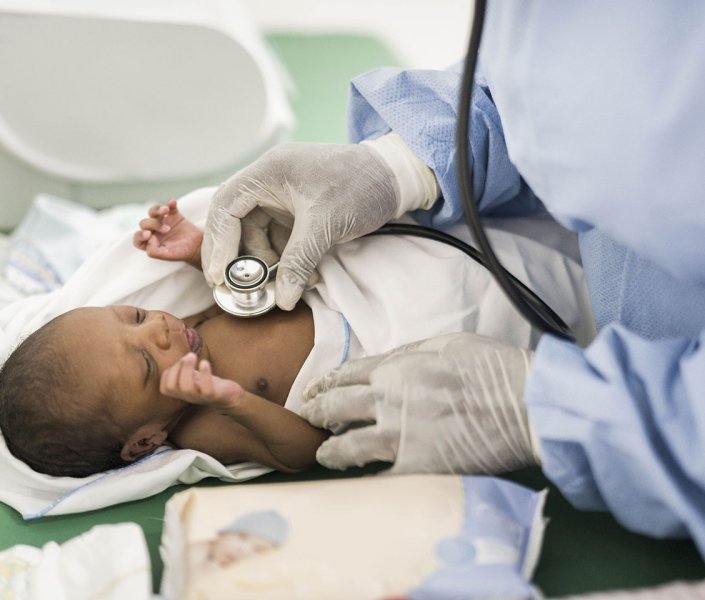Progress report African region 21 - 5. Building back better
Addressing the crisis and strengthening health systems to achieve health security

Until the COVID-19 pandemic is over, Member States’ health systems should remain on high alert and continuously prepare for a surge of cases. This requires strong national and subnational multisectoral coordination mechanisms; close monitoring of trends at the lowest possible level; adjusting public health and social measures (PHSM) accordingly, including avoiding mass gatherings during rising trends; continuous risk assessment, readiness assessment and forecasting of needs and addressing the gaps; continued increase in oxygen production and hospital bed capacity; increasing laboratory surge and genomic sequencing capacity; increasing the health workforce, and managing it effectively to minimize burnouts and grievances; and increasing investments in often unprioritized areas, such as primary care. The latter is included because the disruption of essential services may potentially cause increases in demand for hospital beds and critical care.
The management of the COVID-19 pandemic requires a comprehensive approach centred on primary care. No single intervention taken in isolation will achieve comprehensive results. Public health and safety measures, the response capacity at the primary level, the progressive expansion of hospital services including Emergency Medical Teams (EMTs), and vaccination must be undertaken together.
The supply of medical oxygen is critical and urgent: increasing supply reliability by establishing supply hubs for oxygen cylinders, which may be shipped quickly on demand, and sustainable local 0² production capacities can save lives.
The response approach should be tailored to country-specific contexts. Both external and internal human expertise should possess a good understanding of the modus operandi of each country. Ideally, support should be adjusted to cultures and norms, and should be scenario-based, with a focus on areas where real gaps exist.
Smart acceleration of vaccination for vulnerable populations and gradually to the entire population. Despite current challenges in meeting the demand for vaccines, Member States should use existing doses to cover targeted vulnerable populations within the lifespan of the vaccines, and gradually extend coverage to other populations. The COVID-19 vaccines have shown protective effect against the severity of the disease for vaccinated people, and consequent reduction in hospitalization and fatalities. Member States should continue to encourage people to follow the science, and – through advocacy – to reduce vaccine hesitancy. Increasing the current availability and distribution of vaccines to the farthest corners of African countries is the only way to ensure that COVID-19 will not become endemic. To achieve herd immunity, however, it is necessary to maintain a continuous level of vaccination, which requires resourcing the sustainable supply, distribution, and implementation of COVID-19 immunization tools.
Strengthening health systems is a precondition for health security; the COVID-19 crisis presents an opportunity to address the most pressing issues in health programming, clinical services, and routine immunization practices.
Increased productivity, economic diversification, and structural reform across Africa will require the strategic production and retention of many highly skilled and employable graduates, particularly in key fields related to science, technology, engineering, and mathematics (STEM), as well as health, agriculture, and social scientists such as medical anthropologists and health economists. These are areas where Africa is currently experiencing a shortage of well-trained scientists and engineers, as well as limited research options.
One of the greatest challenges in building health security is establishing interconnected whole-of-delivery health systems, where logistics, personnel, treatment, communication, and information management are integrated. To this end, WHO-AFR advocates for building capacity hubs within Africa’s university system.
Regarding the COVID-19 response, enhancing case management and critical care capacities is crucial to saving lives. To this end, WHO-AFR will continue to support procurement of essential medicines. In addition, to ensure the continuity of health services, WHO-AFR will continue to support countries in trainings; disseminating guidelines on management of home-based intermediate care (HBIC) for severe and critically ill patients; enhancing personal protective measures – public health and social measures (PHSM) –, and infection prevention and control (IPC) in communities, and effective screening and triage in hospitals; providing guidelines for enforcing surveillance in the community; establishing community engagement platforms for improved communication to the public to stop the infodemic leading to myths, fears and denial; supporting expanded laboratory services; and encouraging vaccine uptake.
With the number of older persons rapidly increasing in the Region, management of conditions of older persons is a priority. In this regard, it is key to promote and support research on ageing and data collection across the life course with age and gender disaggregation of data. This is especially important for developing long-term care systems and services, training and support to families providing care to older people to promote human rights and reduce abuse of older persons.
Ensuring that WHO-AFR can provide state-of-the-art advice to countries requires investment in, and retention of qualified, advanced personnel; to this end, it is key to maintain well-trained and healthy human resources, as well as an adequate training budget.



